Business Continuity Strategy Phase of the BCM Planning Methodology for Hotel
The Business Continuity Strategy (BCS) phase is pivotal in hotels' BCM planning methodology.
After identifying critical business functions and assessing the potential impacts of disruptions during the Business Impact Analysis (BIA) phase, the next step is to develop robust continuity strategies that will enable the hotel to resume operations as swiftly and efficiently as possible.
This phase also determines the best recovery strategies, resource allocation, and integration of continuity efforts across hotel departments.
 During the Business Continuity Strategy phase, hotels must align their recovery objectives—defined as Recovery Time Objectives (RTOs) and Recovery Point Objectives (RPOs)—with practical, actionable strategies that address each identified risk.
During the Business Continuity Strategy phase, hotels must align their recovery objectives—defined as Recovery Time Objectives (RTOs) and Recovery Point Objectives (RPOs)—with practical, actionable strategies that address each identified risk.
The goal is to create a roadmap for recovery that can be activated when necessary.
The strategy developed in this phase should be flexible, scalable, and customised to the hotel’s unique operational structure, capacity, and guest needs.
Whether faced with a localised disruption or a widespread crisis, these strategies will guide the hotel through a recovery process that minimises business interruptions and protects the interests of both guests and the organisation.
Effective continuity strategies must also incorporate communication plans, training, and testing procedures to ensure all staff members know their roles during a crisis.
Coordination between hotel departments—such as the front desk, operations, IT, housekeeping, and security—is crucial to ensuring that the continuity strategies are seamlessly implemented.
The BCS phase also includes identifying and preparing necessary resources (e.g., personnel, technology, infrastructure, and suppliers) to execute these strategies successfully.
Developing Recovery Strategies
The first step in developing continuity strategies is identifying the recovery requirements for each critical business function outlined in the BIA phase. Recovery strategies will vary depending on the function's nature and the severity of its potential impact if disrupted.
For example, for functions such as guest accommodation, recovery might involve ensuring that the hotel’s room booking system is restored as quickly as possible.
At the same time, strategies may focus on maintaining inventory supply chains or providing backup power sources are available to keep kitchens operational for food and beverage services.
There are several strategic options that hotels can consider in the BCS phase:
Alternative Operational Models
These strategies involve using backup sites or alternative locations for operations.
If the primary property is temporarily unusable, a nearby hotel or off-site facilities may be used to accommodate guests and continue providing essential services.
Technology Solutions
Hotels should assess the role of IT in supporting critical functions, such as reservations, property management, and communication.
Implementing redundant systems, cloud-based solutions, and disaster recovery tools can ensure the availability of vital systems during a disruption.
Cross-Department Coordination
Hotels should define clear communication and operational roles for staff during a crisis.
The involvement of multiple departments, including HR, security, facilities management, and guest services, ensures a smooth response and minimises the operational impact of the disruption.
Vendor and Supply Chain Management
Establishing relationships with key suppliers and service providers and contingency plans for supply chain disruptions can minimise operational downtime.
For instance, ensuring that backup suppliers are available for food, cleaning products, and linens can keep hotel operations running even if the primary supplier is affected by an event.
These strategies must be evaluated for effectiveness, cost, and scalability to ensure they are practical and aligned with the hotel’s risk profile and continuity objectives.
Resource Allocation and Recovery Priorities
Once recovery strategies are developed, the next step is to allocate resources effectively to support these strategies.
Resource allocation is critical to ensuring that the right personnel, equipment, and technology are available when needed.
During the BCS phase, hotels must:
Prioritise Resource Allocation
Based on the recovery priorities established in the BIA phase, hotels should first secure resources for the most critical functions.
For example, supporting front desk and guest accommodation systems should precede non-essential functions like administrative offices.
Establish Recovery Teams
Each hotel department should designate a recovery team responsible for implementing specific aspects of the continuity plan.
These teams must be trained and well-prepared to respond swiftly during a crisis.
Infrastructure and Technology Readiness
Hotels must ensure they have the necessary infrastructure, such as backup generators, cloud storage for critical data, and emergency communication systems.
IT infrastructure readiness is vital for business continuity, as technology supports key operations such as reservations, billing, and guest services.
Training and Awareness
Ongoing training is essential for ensuring staff members know the continuity strategies and their roles during a crisis.
Regular drills and simulation exercises help reinforce these strategies and improve overall preparedness.
Crisis Communication and Crisis Management Plans
Effective communication during a disruption is essential to the success of BCM strategies. Hotels must develop clear communication plans to ensure that internal and external stakeholders are informed of the situation and any actions being taken.
This includes communication with employees, guests, suppliers, and regulatory authorities.
Internal Communication
A clear, concise communication structure should be established to facilitate coordination among departments during a crisis.
Communication protocols must be in place to notify staff of disruptions and recovery procedures, ensuring everyone is aligned in responding to the situation.
External Communication
Guests must be informed about the status of their reservations, check-in/check-out processes, and any service changes.
Additionally, hotels may need to communicate with suppliers to manage inventory and maintain service levels.
Crisis Management Team
A designated crisis management team, typically composed of senior leadership and key department heads, should be established to make decisions and oversee the implementation of continuity strategies during a crisis.
The crisis management team should have predefined roles and responsibilities to ensure a swift, coordinated response.
Summing Up …
The BCS phase is critical in ensuring that hotels are prepared to respond to disruptions in a way that minimises downtime, protects the guest experience, and supports operational recovery.
By developing tailored recovery strategies, allocating resources effectively, and implementing comprehensive communication plans, hotels can ensure resilience in crises. This phase provides the blueprint for how a hotel will recover essential operations, protect its reputation, and continue to serve guests during and after a disruption.
In the next phase, hotels will focus on testing, exercising, and refining these continuity strategies to ensure they are practical and ready to be activated in an actual crisis.
This ongoing evaluation and improvement process ensures the hotel remains agile and resilient, ready to handle any disruption.
More Information About Business Continuity Management Courses

 To learn more about the course and schedule, click the buttons below for the BCM-300 Business Continuity Management Implementer [B-3] course and the BCM-5000 Business Continuity Management Expert Implementer [B-5].
To learn more about the course and schedule, click the buttons below for the BCM-300 Business Continuity Management Implementer [B-3] course and the BCM-5000 Business Continuity Management Expert Implementer [B-5].
![Register [BL-B-3]*](https://no-cache.hubspot.com/cta/default/3893111/ac6cf073-4cdd-4541-91ed-889f731d5076.png) |
 |
 |
 |
 |
 |
![FAQ [BL-B-3]](https://no-cache.hubspot.com/cta/default/3893111/b3824ba1-7aa1-4eb6-bef8-94f57121c5ae.png) |
If you have any questions, click to contact us.
|
 |
 |
 |
 |


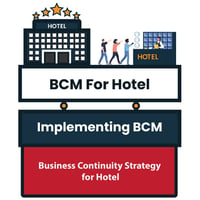
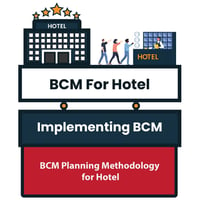
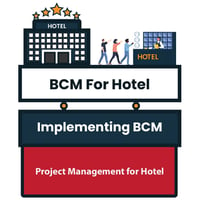
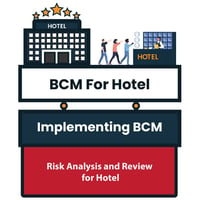
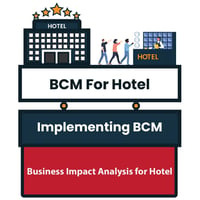
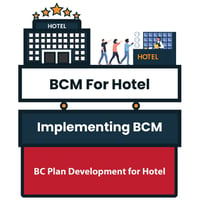
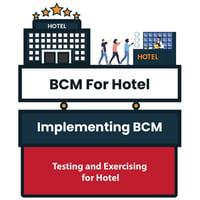
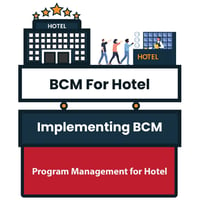
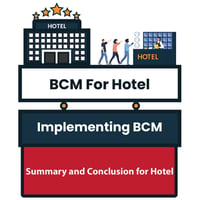
![Email to Sales Team [BCM Institute]](https://no-cache.hubspot.com/cta/default/3893111/3c53daeb-2836-4843-b0e0-645baee2ab9e.png)

